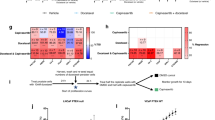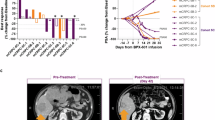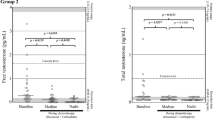Abstract
We report that all- trans retinoic acid (ATRA) enhanced the toxicity of docetaxel against DU145 and LNCaP prostate cancer cells, and that the nature of the interaction between ATRA and docetaxel was highly synergistic. Docetaxel-induced apoptotic cell death was associated with phosphorylation and hence inactivation of Bcl-2. ATRA enhanced docetaxel-induced apoptosis and combined treatment with ATRA and docetaxel resulted in down-regulation of Bcl-2. Docetaxel caused phosphorylation and hence inactivation of cdc2 kinase result ing in G2/M arrest. ATRA inhibited docetaxel-induced phosphorylation of cdc2 resulting in activation of cdc2 kinase and partial reversal of the G2/M arrest. ATRA also inhibited docetaxel-induced activation of MAPK indicating that the effects of docetaxel and ATRA on cdc2 phosphorylation are dependent on MAPK. We conclude that ATRA synergistically enhances docetaxel toxicity by down-regulating Bcl-2 expression and partially reverses the docetaxel-induced G2/M arrest by inhibiting docetaxel-induced cdc2 phosphorylation in a pathway that is dependent on MAPK. © 2001 Cancer Research Campaign http://www.bjcancer.com
Similar content being viewed by others
Article PDF
Change history
16 November 2011
This paper was modified 12 months after initial publication to switch to Creative Commons licence terms, as noted at publication
References
Aebi S, Kroning R, Cenni B, Sharma A, Fink D, Los G, Weisman R, Howell SB and Christen RD (1997) all-trans retinoic acid enhances cisplatin-induced apoptosis in human ovarian adenocarcinoma and in squarmous head and neck cancer cells. Clin Cancer Res 3: 2033–2038
Amos B and Lotan R (1990) Retinoid-sensitive cells and cell lines. Methods Enzymol 190: 217–225
Andreeff M, Jiang S, Zhang Z, Konopleva M, Estrov Z, Snell VE, Xie Z, Okcu MF, Sanchez-Williams G and Dong J (1999) Expression of Bcl-2-related genes in normal and AML progenitors: changes induced by chemotherapy and retinoic acid. Leukemia 13: 1881–1892
Bitangcol JC, Chau AS, Stadnick E, Lohka MJ, Sicken B and Shibuya EK (1998) Activation of the p42 mitogen-activated protein kinase pathway inhibits cdc2 activation and entry into M-phase in cycling Xenopus egg extracts. Molecular Biology of the Cell 9: 451–467
Bradbury DA, Aldington S, Zhu YM and Russell NH (1996) Down-regulation of bcl-2 in AML blasts by all-trans retinoic acid and its relationship to CD34 antigen expression. British J Hematol 94: 671–675
Caliaro MJ, Marmouget C, Guichard S, Mazars P, Valette A, Moisand A, Bugat R and Jozan S (1994) Response of four human ovarian carcinoma cell lines to all-trans retinoic acid: relationship with induction of differentiation and retinoic acid receptor expression. Int J Cancer 56: 743–748
Caliaro MJ, Vitaux P, Lafon C, Lochon I, Nehmé A, Valette A, Canal P, Bugat R and Jozan S (1997) Multifactorial mechanism for the potentiation of cisplatin (CDDP) cytotoxicity by all-trans retinoic acid (ATRA) in human ovarian carcinoma cell lines. Br J Cancer 75: 333–340
Catalona WJ (1994) Management of cancer of the prostate. The New England Journal of Medicine 331: 996–1004
Chou J and Chou TC (1986) Multiple drug-effect analysis. In: Dose-effect analysis with microcomputers. Chou J and Chou TC (eds) pp. 19–64. Elsevier Science Publishing Company, Inc: Amsterdam, Netherlands
Chou TC and Talalay P (1984) Quantitative analysis of dose-effect relationships: the combined effects of multiple drugs or enzyme inhibitors. Adv Enz Regulation 22: 27–55
Dean PN and Jett JH (1974) Mathematical analysis of DNA distributions derived from flow microfluorometry. J Cell Biol 60: 523–527
Ding A, Chen B, Fuortes M and Blum E (1996) Association of mitogen-activated protein kinases with microtubules in mouse macrophages. J Exp Med 183: 1899–1904
Formelli F and Cleris L (1993) Synthetic retinoid fenretinide is effective against a human ovarian carcinoma xenograft and potentiates cisplatin activity. Cancer Res 53: 5374–5376
Haldar S, Negrini M, Monne M, Sabbioni S and Croce CM (1994) Down-regulation of bcl-2 by p53 in breast cancer cells. Cancer Res 54: 2095–2097
Haldar S, Jena N and Croce CM (1995) Inactivation of Bcl-2 by phosphorylation. Proc Natl Acad Sci USA 92: 4507–4511
Haldar S, Chintapalli J and Croce CM (1996) Taxol induces bcl-2 phosphorylation and death of prostate cancer cells. Cancer Res 56: 1253–1255
Haldar S, Basu A and Croce CM (1997) Bcl2 is the guardian of microtubule integrity. Cancer Res 57: 229–233
Haldar S, Basu A and Croce CM (1998) Serine-70 is one of the critical sites for drug-induced Bcl-2 phosphorylation in cancer cells. Cancer Res 58: 1609–1615
Hu ZB, Minden MD and McCulloch EA (1995) Direct evidence for the participation of bcl-2 in the regulation by retinoic acid of the Ara-C sensitivity of leukemic stem cells. Leukemia (Baltimore) 9: 1667–1673
Hu ZB, Minden MD and McCulloch EA (1998) Phosphorylation of BCL-2 after exposure of human leukemic cells to retinoic acid. Blood 92: 1768–1775
Kaufmann SH, Desnoyers S, Ottaviano Y, Davidson NE and Poirier GG (1993) Specific proteolytic cleavage of poly(ADP-ribose)polymerase: an early marker of chemotherapy-induced apoptosis. Cancer Res 53: 3976–3985
Lin A, Minden A, Martinetto H, Claret FX, Lange Carter C, Mercurio F, Johnson GL and Karin M (1995) Identification of a dual specificity kinase that activates the Jun kinases and p38-Mpk2. Science 268: 286–290
Lotan R (1994) Suppression of squamous cell carcinoma growth and differentiation by retinoids. Cancer Res (Suppl.) 54: 1987s–1990s
Mangelsdorf DJ, Umesono K and Evans RM (1994) The retinoid receptors. In: Sporn MB, Roberts AB and Goodman DS (eds), The Retinoids Biology Chemistry and Medicine Ed. 2, pp. 319–349. New York: Raven Press
McGahon AJ, Martin SM, Sissonnette RP, Mahboubi A, Shi Y, Mogil RJ, Nishioka WK and Green DR (1995) The end of the cell line: Methods for the study of apoptosis. Cell Death
Monks A, Scudiero D, Skehan P, Shoemaker R, Paull K, Vistica D, Hose C, Langley J, Cronise P, Vaigro-Wolff A, Gray-Woodrich M, Campbell H, Mayo J and Boyd M (1991) Feasibility of a high-flux anticancer drug screen using a diverse panel of cultured human tumor cell lines. J Natl Cancer Inst 83: 757–766
Nagy L, Thomazy VA, Chandraratna RAS, Heyman RA and PJA D (1996) Retinoid-regulated expression of bcl-2 and tissue transglutaminase during the differentiation and apoptosis of human myeloid leukemia (HL-60) cells. Leukemia Res 20: 499–505
Nicholson DW, Ali A, Thomberry NA, Vaillancourt JP, Ding CK, Gallant M, Gareau Y, Griffin PR, Labelle M, Lazebnik YA, Munday NA, Raju SM, Smulson ME, Yamin TT, Yu VL and Miller DK (1995) Identification and inhibition of the ICE/CED-3 protease necessary for mammalian apoptosis. Nature (Lond.) 376: 37–43
Petrylak DP, Macarthur RB, O'Connor J, Shelton G, Judge T, Balog J, Pfaff C, Bagiella E, Heitjan D, Fine R, Zuech N, Swczuk I, Benson M and Olsson CA (1999) Phase I trial of docetaxel estramustine in androgen-independent prostate cancer. J Clin Oncol 17: 858–867
Picus J and Schultz M (1999) Docetaxel as monotherapy in the treatment of hormone-reractory prostate cancer: preliminary results. Sem Oncol 26: 14–18
Pisani F, Del Poeta G, Aronica G, Venditti A, Caravita T and Amadori S (1997) In vitro down-regulation of bcl-2 expression by all-trans retinoic acid in AML blasts. Ann Hematol 75: 145–147
Sacks PG, Harris D and Chou T-C (1995) Modulation of growth and proliferation in squamous cell carcinoma by retinoic acid: a rationale for combination therapy with chemotherapeutic agents. Int J Cancer 61: 409–415
Savarese D, Taplin ME, Halabi S, Hars V, Kreis W and Vogelzang N (1999) A phase II study of docetaxel, estramustine and low dose hydrocortisone in men with hormone-refractory prostate cancer: preliminary results of cancer and leukemia group B Trial 9780. Sem Oncol 26: 39–44
Seiter K, Feldman EJ, HD Deptala A, Traganos F, Burke HB, Hoang A, Goff H, Pozzuoli M and Kancherla R (2000) Clinical and laboratory evaluation of all-trans retinoic acid modulation of chemotherapy in patients with acute myelogenous leukemia. British J Hematol 108: 40–47
Shapiro GI and Hapre JW (1999) Anticancer drug targets: cell cycle and checkpoint control. J Clin Invest 104: 1645–1663
Shtil AA, Mandlekar S, Yu R, Walter RJ, Hagen K, Tan TH, Roninson IB and Kong AT (1999) Differential regulation of mitogen-activated protein kinases by microtubule-binding agents in human breast cancer cells. Oncogene 18: 334–384
Sinha AA, Blackard CE and Seal US (1977) A critical analysis of tumor morphology and hormone treatments in the untreated and estrogen-treated responsive and refractory human prostatic carcinoma. Cancer (Phila) 40: 2836–2850
Skehan P, Storeng R, Scudiero D, Monks A, McMahon J, Vistica D, Warren JT, Bokesch H, Kenney S and Boyd MR (1990) New colorimetric cytotoxicity assay for anticancer-drug screnning. J Natl Cancer Inst 82: 1107–1112
Wang TH, Wang HS, Ichijo H, Giannakakou P, Foster JS, Fojo T and Wimalasena J (1998) Microtubule-interfering agents activate c-Jun N-terminal kinase/stress-activated protein kinase through both ras and apoptosis signal-regulating kinase pathways. J Biol Chem 273: 4928–4936
Author information
Authors and Affiliations
Rights and permissions
From twelve months after its original publication, this work is licensed under the Creative Commons Attribution-NonCommercial-Share Alike 3.0 Unported License. To view a copy of this license, visit http://creativecommons.org/licenses/by-nc-sa/3.0/
About this article
Cite this article
Nehmé, A., Varadarajan, P., Sellakumar, G. et al. Modulation of docetaxel-induced apoptosis and cell cycle arrest by all- trans retinoic acid in prostate cancer cells. Br J Cancer 84, 1571–1576 (2001). https://doi.org/10.1054/bjoc.2001.1818
Received:
Revised:
Accepted:
Published:
Issue date:
DOI: https://doi.org/10.1054/bjoc.2001.1818
Keywords
This article is cited by
-
CKD-516 potentiates the anti-cancer activity of docetaxel against epidermal growth factor receptor tyrosine kinase inhibitor-resistant lung cancer
Toxicological Research (2023)
-
Proteomic characterization of gastric cancer response to chemotherapy and targeted therapy reveals potential therapeutic strategies
Nature Communications (2022)
-
Inhibition of Notch pathway enhances the anti-tumor effect of docetaxel in prostate cancer stem-like cells
Stem Cell Research & Therapy (2020)
-
Regulatory Role of Quiescence in the Biological Function of Cancer Stem Cells
Stem Cell Reviews and Reports (2020)
-
Identification of a candidate prognostic gene signature by transcriptome analysis of matched pre- and post-treatment prostatic biopsies from patients with advanced prostate cancer
BMC Cancer (2014)



